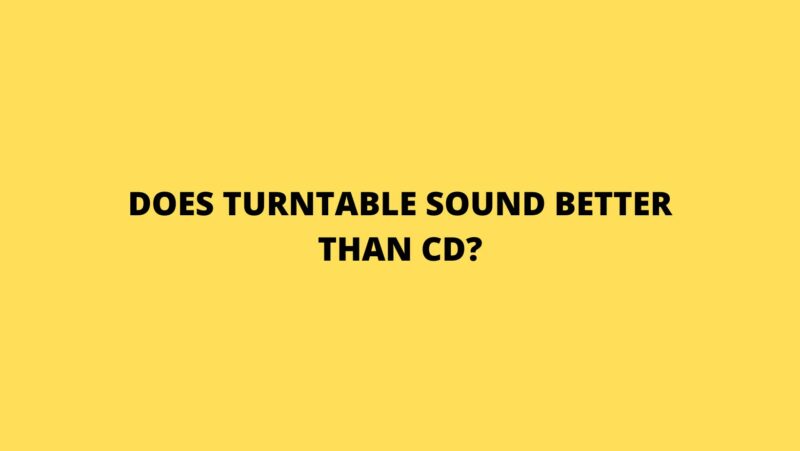The debate about turntable vs. CD sound quality has been raging for decades. Some people swear that vinyl records sound warmer, richer, and more engaging than CDs, while others argue that CDs are objectively superior in terms of sound quality.
There are a number of factors that contribute to the sound quality of a turntable or CD player. These include the quality of the recording, the quality of the playback equipment, and the listening environment. However, the most fundamental difference between turntables and CDs is the way they represent sound.
Technical aspects of sound quality
Analog audio is represented as a continuous wave form, while digital audio is represented as a series of discrete samples. This difference has a number of implications for sound quality.
One advantage of analog audio is that it has a higher dynamic range. This means that it can reproduce a wider range of sound levels, from the softest whispers to the loudest crashes. Digital audio, on the other hand, is limited by the number of bits used to represent each sample. This can result in a loss of detail in the sound, especially at the loudest and softest levels.
Another advantage of analog audio is that it is less susceptible to noise. This is because the analog signal is continuous, so there are no gaps where noise can be introduced. Digital audio, on the other hand, is made up of discrete samples, and these samples can be corrupted by noise.
The subjective experience of sound quality
Even though there are clear technical advantages to analog audio, many people still prefer the sound of CDs. This is because our perception of sound quality is not always based on objective factors. Our expectations, our personal preferences, and even our mood can all influence how we hear music.
For example, people who grew up listening to vinyl records may be more likely to prefer the sound of vinyl, even if they can’t consciously identify any specific differences. This is because their brains have been conditioned to associate the sound of vinyl with positive experiences.
The role of placebo effect
The placebo effect is a phenomenon where people experience a real effect from a treatment that is actually ineffective. This can happen even when people know that the treatment is not real.
The placebo effect can also play a role in the debate about turntable vs. CD sound quality. People who believe that vinyl sounds better may actually hear it better, even if there is no real difference in the sound quality.
The impact of other factors
The quality of the turntable, speakers, and listening environment can all have a significant impact on sound quality. A poor-quality turntable or speakers can make even the best recordings sound bad. Similarly, listening to music in a noisy environment can also degrade the sound quality.
Conclusion
The debate about turntable vs. CD sound quality is likely to continue for many years to come. There is no clear consensus on which format sounds better, and the answer may vary from person to person. Ultimately, the best way to decide which format you prefer is to listen to both and see which one you like better.
In addition to the points mentioned above, here are some other factors that can affect the sound quality of turntables and CDs:
- The type of cartridge used on the turntable.
- The quality of the stylus.
- The condition of the record.
- The type of amplifier and speakers used.
- The listening environment.


